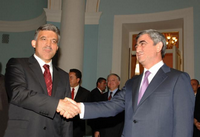Demonstrating a predictable lack of strategic foresight, the U.S. Congress plans to renew its obsession with the Armenian genocide tomorrow, when the House Committee on Foreign Affairs will hold its mark-up session for the Armenian Genocide resolution. In 2007, the resolution -- which "[calls] upon the president to ensure that the foreign policy of the United States reflects appropriate understanding and sensitivity concerning . . . the Armenian Genocide" -- passed out of committee but never reached a vote on the House floor, following a strong pushback effort from the Bush administration. The supporters of this year's iteration hope the Obama White House will prove less resistant to its foreign policy being held hostage to Congress's parochial interests.
While there is little doubt outside of Turkey that genocide was perpetrated against the Armenians in the 1910s, the resolution threatens to undermine U.S. foreign policy in the Middle East and South Caucasus at exactly the wrong time. Turkey and Armenia are currently in the midst of a slow-going rapprochement, an effort broadly opposed by the Armenian diaspora in the U.S., but supported by the Obama administration. Meanwhile, Washington needs Ankara onside with regards to Iran, especially as the U.S. pushes for a new sanctions resolution in the U.N. Security Council, where Turkey holds a non-permanent seat. The Armenian Genocide resolution would scuttle both efforts.
Turkish-Armenian rapprochement has progressed in fits and starts for more than two years, but it appears to have again stalled. Since signing two protocols in October 2009 that outlined the path toward normalizing diplomatic relations and opening borders, the two neighbors have made little tangible progress. Armenian President Serzh Sarkisian has made it clear that the country's parliament will not ratify the protocols until Turkey does so first. For its part, Turkey has belatedly linked ratification of the agreements to progress in resolving the stalemated conflict over Nagorno-Karabakh, an ethnic Armenian province seeking independence -- with Armenia's support -- from Azerbaijan. Ankara had long conditioned normalizing ties with Armenia on a resolution of the dispute, but agreed to forgo the demand in signing last October's agreements. Ankara reversed course once again in response to vocal opposition to the agreements from nationalists at home and longstanding ally Azerbaijan abroad. Armenia rejects the renewed linkage, rightly pointing out that neither protocol mentions Nagorno-Karabakh.

